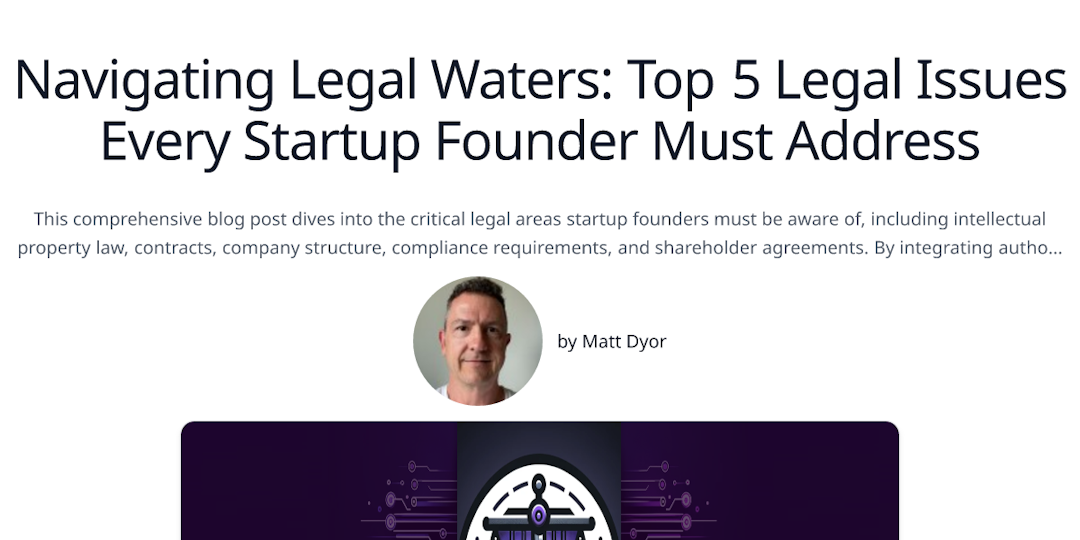Starting a business is an exhilarating journey, but it's fraught with challenges, especially in the legal domain. For founders, understanding and navigating these legal challenges from the onset is vital to securing the future of their startups. This post delves into the most common legal hurdles faced by startup founders during their critical first year, offering guidance to steer clear of potential pitfalls.
Intellectual Property Rights: Protecting Your Ideas and Innovations
A foundational concern for any startup is safeguarding its intellectual property (IP). Whether it’s a novel product, a unique service method, or a brand name, securing proper IP protection is crucial. The decision of when to file for a patent, for example, is a significant strategic move for startups.
According to Patent Timing: When Should I file my Patent Application? at leanfounder.attorneymesh.com/patent-timing-when-should-i-file-my-patent-application ↗, determining the optimal moment to file can affect the trajectory of a startup significantly. The discussion outlines how early filings can preempt competitors but also stresses the importance of having a fully developed idea to ensure comprehensive protection.
Q: How important is it to file for a patent early? A: Filing early can be crucial in sectors where technology evolves rapidly. However, ensuring that your concept is fully developed can provide more robust protection.
Navigating Founder Agreements: Solidifying Your Startup's Foundation
At the heart of every startup is its founding team. Early clarity on the roles, ownership stakes, and responsibilities through a well-crafted founder’s agreement prevents conflicts that could derail the business. Key considerations include equity distribution, decision-making processes, and provisions for leaving founders.
Q: What should a founder's agreement include? A: A comprehensive founder's agreement should address equity ownership, roles and responsibilities, decision-making protocols, and terms for resolving disputes and handling exits.
Regulatory Compliance: Staying Within Legal Boundaries
Understanding the regulatory landscape of your industry is non-negotiable. This covers data protection laws, employment standards, and industry-specific regulations. Startups, especially those in tech and online platforms, must be vigilant about data protection laws such as GDPR or CCPA, as non-compliance can lead to hefty fines.
For details, check out Key Legal Requirements for Your Startup's Website: Understanding EULA, Privacy Policy, TOS, and Cookie Policy ↗ at https://leanfounder.attorneymesh.com/key-legal-requirements-for-your-startups-website ↗
Contractual Agreements: The Backbone of Business Relationships
Whether it's employment contracts, service agreements, or partnership deals, having solid contracts in place is imperative. These documents should clearly state the terms of engagement, deliverables, timelines, and conflict resolution mechanisms. It is probably not possible or desirable to put every business decision in a contract, but you can help to remove uncertainty by having clearly written plans in email. If something is verbally changed, take the time to reflect this change in a follow up email, including language that this new email reflects the points agreed upon. Even if this email exchange does not establish contractual legal rights, it will improve the likelihood of a positive business engagement and reduce the likelihood that a legal remedy will be needed.
Q: Why are clear contractual agreements important? A: They establish expectations, safeguard against misunderstandings, and provide a framework for resolving disputes, thereby protecting both the startup and its partners.
Financing and Equity: Understanding the Legal Implications
Securing funding is a significant milestone for startups but comes with legal considerations. Founders must understand the implications of different funding options on ownership and control. Equity arrangements with investors should be transparent and consider future rounds of funding to avoid dilution of founders' stakes unnecessarily. Whether this is personal liability for a loan or taking on equity with founder-unfriendly terms ↗, take the time to understand the agreements that you are signing and talk to other founders to better understand if you are taking on unwarranted risk.
Navigating the legal landscape in the first year requires a proactive approach. Startups should seek to understand and address these common legal challenges early on. By doing so, founders can focus on growth and innovation, secure in the knowledge that their legal foundations are solid.
For further discussion or questions, we encourage you to use the "Ask a Question" button at the top of the page or continue this conversation through the contact button.
Tags: Startup Law, Intellectual Property, Founder Agreements, Regulatory Compliance, Contract Law, Financing and Equity





















